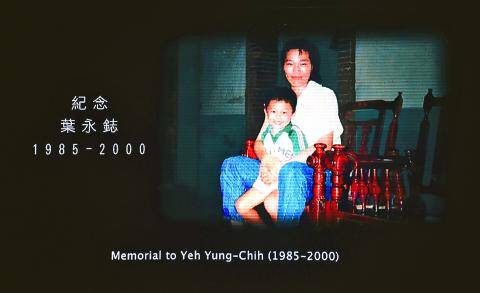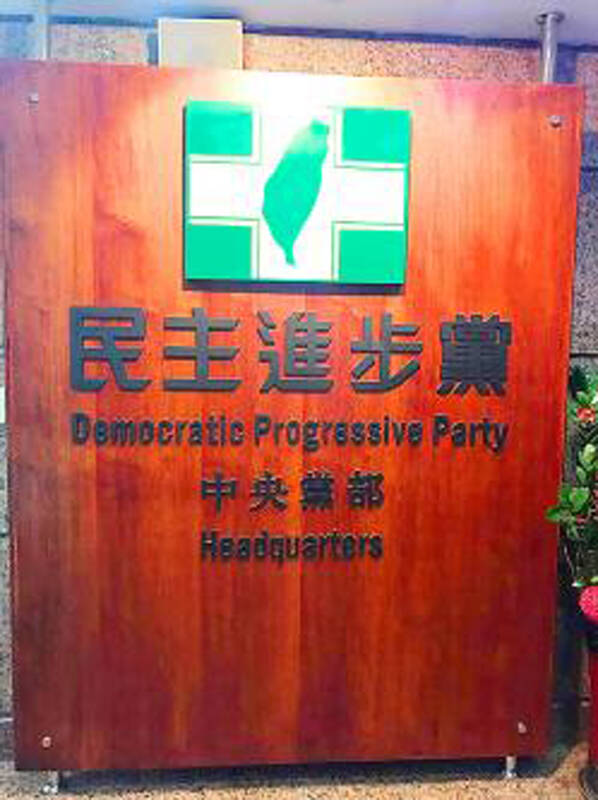The Democratic Progressive Party (DPP) yesterday paid tribute to “rose boy” Yeh Yung- chih (葉永鋕), whose death in 2000 prompted Taiwan’s designation of April 20 as Gender Equality Education Day.
In a Facebook post, the DPP said Yeh’s death 25 years ago spurred the enactment of the Gender Equity Education Act (性別平等教育法) in Taiwan as well as the April 20 designation.
The death of the junior high school student in Pingtung County resulted in the act’s promulgation in 2004, and the Ministry of Education announced the day’s designation in 2022.

Photo: Pan Shao-tang, Taipei Times
The DPP cited several pieces of legislation, such as the Stalking and Harassment Prevention Act (跟蹤騷擾防制法) in 2021 and the amended Sexual Harassment Prevention Act (性騷擾防治法) and Gender Equality in Employment Act (性別工作平等法), which took effect in 2024, that it said reflected its efforts to push for gender equality.
Very small things can make significant contributions to gender equality, it said, including avoiding verbal attacks on anyone for one’s gender expression, regardless of the individual’s political stance.
The DPP also urged condemnation of gender-based speech or violence, which the party said is everyone’s responsibility.

Photo: Taipei Times
In a separate post titled “Have you heard the story of ‘rose boy’ Yeh Yung-chih,” Presidential Office Secretary-General Pan Men-an (潘孟安) said Yeh had been bullied for his “unique gender expression.”
He had taken to using the bathroom during class time instead of at recess due to constant bullying, and on April 20, 2000, he was found lying on the floor of the school bathroom, wrote Pan, who at the time was a Pingtung County councilor.
Yeh was found in a pool of blood, and died in hospital on the next day. In 2006, the Taiwan High Court concluded that Yeh died after slipping on a wet floor and fatally hitting his head on the ground while hurrying back to class.
According to the Ministry of Education, “rose boy,” a Chinese translation of the title of 1997 film “Ma vie en rose,” was used by rights advocates to describe Yeh in Taiwan.

Taiwan has received more than US$70 million in royalties as of the end of last year from developing the F-16V jet as countries worldwide purchase or upgrade to this popular model, government and military officials said on Saturday. Taiwan funded the development of the F-16V jet and ended up the sole investor as other countries withdrew from the program. Now the F-16V is increasingly popular and countries must pay Taiwan a percentage in royalties when they purchase new F-16V aircraft or upgrade older F-16 models. The next five years are expected to be the peak for these royalties, with Taiwan potentially earning

STAY IN YOUR LANE: As the US and Israel attack Iran, the ministry has warned China not to overstep by including Taiwanese citizens in its evacuation orders The Ministry of Foreign Affairs (MOFA) yesterday rebuked a statement by China’s embassy in Israel that it would evacuate Taiwanese holders of Chinese travel documents from Israel amid the latter’s escalating conflict with Iran. Tensions have risen across the Middle East in the wake of US and Israeli airstrikes on Iran beginning Saturday. China subsequently issued an evacuation notice for its citizens. In a news release, the Chinese embassy in Israel said holders of “Taiwan compatriot permits (台胞證)” issued to Taiwanese nationals by Chinese authorities for travel to China — could register for evacuation to Egypt. In Taipei, the ministry yesterday said Taiwan

POSITIVE DEVELOPMENT: Japan and the US are expected to hold in-depth discussions on Taiwan-related issues during the meeting next month, Japanese sources said The holding of a Japan-US leaders’ meeting ahead of US President Donald Trump’s visit to China is positive news for Taiwan, former Japan-Taiwan Exchange Association representative Hiroyasu Izumi said yesterday. After the Liberal Democratic Party’s landslide victory in Japan’s House of Representatives election, Japanese Prime Minister Sanae Takaichi is scheduled to visit the US next month, where she is to meet with Trump ahead of the US president’s planned visit to China from March 31 to April 2 for a meeting with Chinese President Xi Jinping (習近平). Japan and the US are expected to hold in-depth discussions on Taiwan-related issues during the

‘LIKE-MINDED PARTNER’: Tako van Popta said it would be inappropriate to delay signing the deal with Taiwan because of China, adding he would promote the issue Canadian senators have stressed Taiwan’s importance for international trade and expressed enthusiasm for ensuring the Taiwan-Canada trade cooperation framework agreement is implemented this year. Representative to Canada Harry Tseng (曾厚仁) in an interview with the Central News Agency (CNA) said he was increasingly uneasy about Ottawa’s delays in signing the agreement, especially as Ottawa has warmed toward Beijing. There are “no negotiations left. Not only [is it] initialed, we have three versions of the text ready: English, French and Mandarin,” Tseng said. “That tells you how close we are to the final signature.” Tseng said that he hoped Canadian Prime Minister Mark Carney